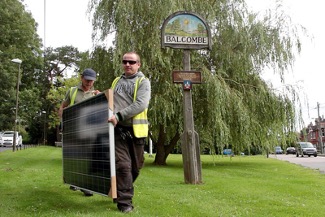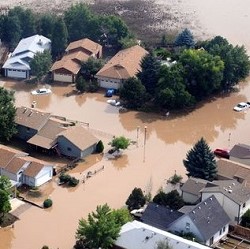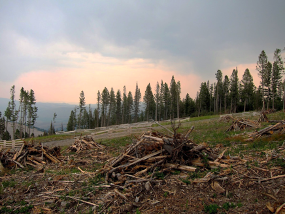As European nations operationalize their commitments to the Paris Agreement, policymakers from across the EU and the UK are promoting the creation of more renewable energy communities (RECs) to scale up decentralized renewable energy production across Europe. However, researchers argue that RECs could actually exacerbate socioeconomic divides. Local and national policies can address potential pitfalls and ensure that RECs can indeed be a mechanism for energy justice in the transition.
Blog
Our blogs are accessible under the CC BY license. Users are free to copy, distribute, transform, and build upon the material as long as they credit Energy Innovation Policy and Technology LLC® for the original creation and indicate if changes were made.
New Oregon Energy Policy Simulator Modeling Shows Major Benefits Of Accelerating Climate Policies
The new Oregon Energy Policy Solutions model helps policymakers measure progress and design additional emissions reduction policies. Oregon EPS modeling finds more ambitious climate policies could cut emissions 74 percent and add $4 billion to the state’s economy by 2050.
Climate Science And Financial risk: Forging A Path To More Climate-Resilient Businesses
As awareness of climate risks grows, more businesses are struggling to quantify climate change impacts, but applying climate model data appropriately is a major challenge. Researchers are identifying new ways climate science can help businesses, investors, and insurance underwriters make more informed decisions.
Addressing Inequities In The Mental Health Burden Of Climate Change
This research review highlight the challenges of studying the mental health impacts of climate change along with the lack of representation in current research of those most vulnerable to and most impacted by climate change.
United States Energy Policy Simulator Update 3.3.1
U.S. Energy Policy Simulator 3.3.1 adds several new features covering the transportation and power sectors, and includes data improvements like an updated business-as-usual trajectory to reflect the American Innovation and Manufacturing Act as well as carbon capture and sequestration deployment.
Dusting For “Fingerprints” On Our Climate: Innovations In The Attribution Of Extreme Events
Extreme weather events are becoming more frequent and more severe as climate change accelerates. Advances in modeling now make it possible to more quickly and reliably determine to what extent global warming causes individual events, offering greater opportunities to educate the public about climate change impacts.
How “Agrivoltaics” Can Provide More Benefits Than Agriculture And Solar Photovoltaics Separately
Solar power plays an essential role in the clean energy transition, but its land-use requirements put it in direct competition with agriculture. New research on agrivoltaics demonstrates the benefits of combining both solar and agricultural production including increased productivity, water conservation, and local economic development, while also bolstering public support for clean energy.
After The Megafires: What’s Left And What’s Next
Research shows increasingly frequent, more intense wildfires in the Western U.S. will dramatically shift the landscape over the coming decades, resulting in the conversion of forests to shrublands, grasslands, or hardwood-dominated ecosystems before 2100, but strategies such as prescribed fires, managed wildfires, and silvicultural treatments could help protect forests.
United States EPS Update 3.3
The United States Energy Policy Simulator 3.3 update builds on the previously released version 3.2.1 by adding demographic breakdowns of premature mortality, improving the user interface, and adding policies to address domestic manufacturing and nitrous oxide emissions, among other improvements.
Tipping Points In Tropical Forests: Carbon Fluxes In The Amazon And Africa
A critical tipping point for the Earth’s climate is the potential transformation of the world’s largest tropical forests from carbon sinks into net sources of emissions, which has been challenging for researchers to predict. But now, groundbreaking studies analyzing observations from Amazonian and African tropical forests find these forests have already reached or are nearing their “saturation points.” Halting deforestation and degradation of forests, while cutting global emissions is critical.










